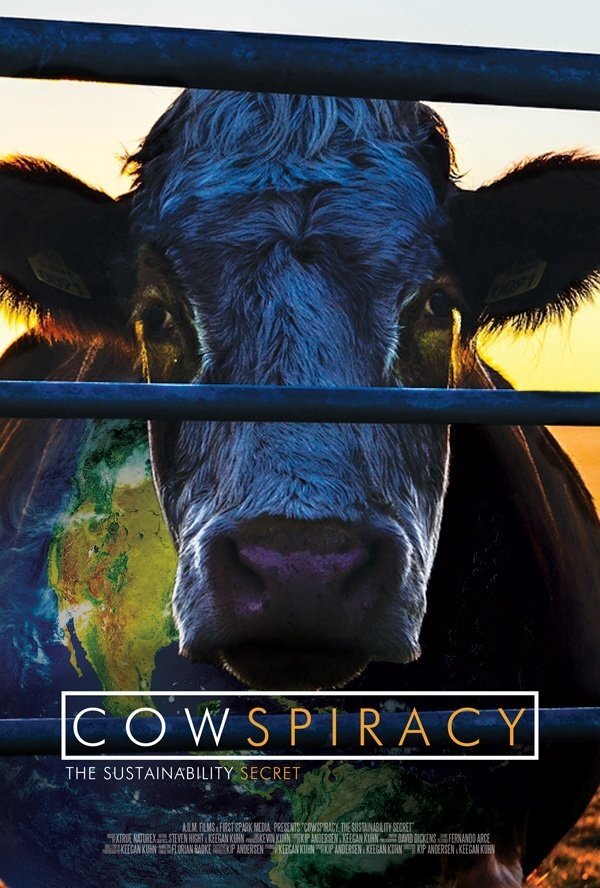Netflix & Change - October 2021 Edition
Written by Daryll Williams
When we talk about climate change, you might be surprised to discover the very inconvenient and uncomfortable truth that animal agriculture is a major contributor to the global environmental catastrophe we currently face.
The topic of sustainability and animal meat-based diets is inextricably linked. And while the diverse discussion around what we consume has been long documented, a significant change has been long overdue.
As such, we’ve decided we’re done with waiting. So let’s keep it moo-ving 🐮
October’s Binge: Cowspiracy
“Animal agriculture is the leading cause of deforestation, water consumption, and pollution...and is a primary driver of rainforest destruction, species extinction, habitat loss, topsoil erosion, ocean ‘dead zones,’ and virtually every other environmental ill. Yet it goes on, almost entirely unchallenged.”
Run time: 90 minutes
This month, we’re leaning into revelatory content. The kind that sits with us long after we’ve switched off the TV and seems to inform much of our conversations going forward. And, quite appropriately, despite its tongue-in-cheek title, Cowspiracy is the most harrowing documentary we’ve seen for a long time.
Although released in 2014, the documentary feels as contemporary and relevant as if it were made yesterday. After all, its central question, “What’s the main cause of climate change?” is timely.
If the title of this visionary work, directed by Kip Andersen and Keegan Kuhn, and produced in the updated version by Leonardo DiCaprio, implies a conspiracy, it is intended to. But the film’s greatest strength is its storytelling, centred around Andersen’s personal journey to find the truth.
The sustainability factor
Overall: 4/5
As it is, Andersen saw Al Gore’s ‘An Inconvenient Truth’. From there, he became obsessed with environmentalism. Thinking he was making a difference by taking ultra-quick showers, recycling obsessively, bike-commuting, and turning off the lights when leaving the room, Andersen worked hard to reduce his carbon footprint. However, he often thought, “with all the continuing ecological crises facing the planet, even if every single one of us adopted these conservation habits, was this really going to be enough to save the world?”
Then he saw a friend’s post: a United Nation’s report stating that raising livestock produces more greenhouse gasses than the entire transportation sector. He realised how the impact of his lifestyle changes was dwarfed by the contribution to greenhouse gas emissions from a diet fed by animal agriculture. And the rest is history.
Throughout, co-producers Kip Andersen and Keegan Kuhn argue that our institutional and individual attention to selected environmental issues will not make a collective difference unless we also confront the realities of animal agriculture. Animal agriculture’s environmental effects are so pervasive that apparent progress elsewhere cannot counter its destructive and growing impact.
This solution, instead, is an environmental advocate’s dream come true. It requires no political action money, no corporate boardroom decisions, no re-negotiated food policy, and no tax incentives. When we eat meat, dairy, and eggs, we feed this growing catastrophe. Change will happen as quickly as we convince each other to change what we eat.
The Viatu review
Themes:
Sustainability is at the film’s forefront. It tackles explicitly the pervasive cognitive dissonance involved in raising animals for food. The film touches on ethics and health, though its foot is firmly planted in the topic at hand: the planet’s destruction. Interviews included in the film read like a who’s who of animal rights activists, with subjects including Will Potter, Howard Lyman, Will Tuttle, Richard Oppenlander, and Michael Klaper.
Production:
With a healthy mixture of graphic design, covert operations, and fascinating interviews, Cowspiracy remains at a steady pace throughout. Making for diverse, engrossing viewing throughout its 90-minute run time.
What makes it different:
As more and more vegan alternatives emerge, consuming our food in more environmentally friendly ways becomes easier. As we come to comprehend the effects of mass agricultural farming, it also becomes conceivable that we may look back at these current meat-eating practices, and wonder, like smoking, why we ever did it. Therefore this film works well, it has a powerful impact, and it may well help inspire a whole new generation to do the right thing for both our health and that of the planet too. Check it out.
Netflix & Change is one of reflection. How can we continue to make changes that have a significant impact? How do we enjoy our planet without leaving footprints in our wake? It’s an eternal question that we at Viatu ask ourselves every single day.
Join the continued digital dialogue on Instagram.


